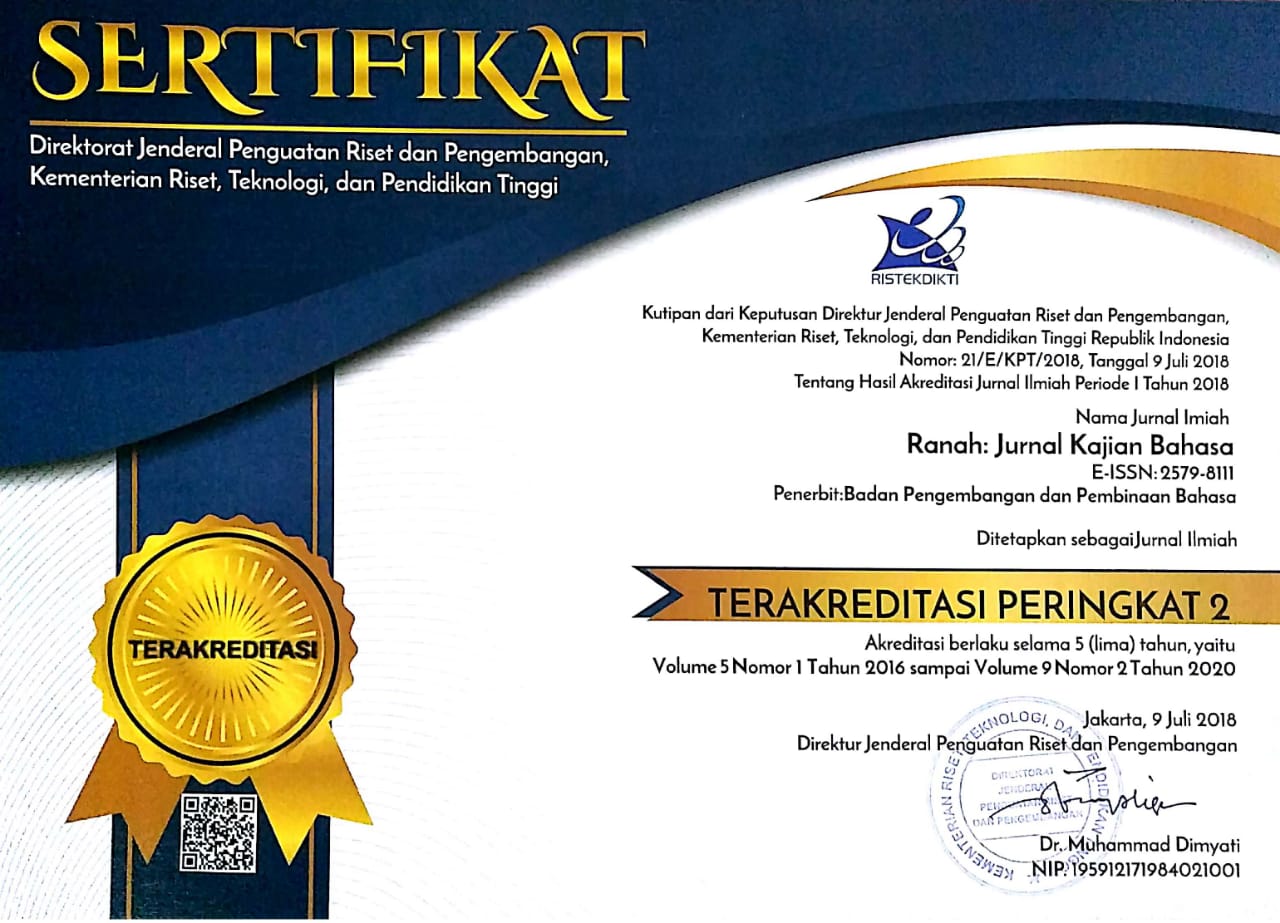Variasi Maksud Kata Emotif “Wela” dalam Bahasa Jawa: Perspektif Sosiopragmatik
Abstract
This study aims to describe manifestation of the variations of meanings of the emotive word 'wela' in Javanese language. The research data were in the form of snippets of utterances which contain variations of meanings of the Javanese emotive word 'wela'. The source of the substantive data was the daily speech of villagers in which there were manifestations of variations in the meaning of the emotive word 'wela'. The data were collected using the observation and interview method. The observation method was done by using the recording and note-taking technique. The interview method was carried out with the face-to-face interview and the indepth interviewing techniques. The next step is the data identification, data classification, and data typification. Data that had been typified were then subjected to data analysis methods and techniques, but previously triangulated to the experts. Data analysis was performed using extralingual equivalent analysis method. Through this research, six meanings of the emotive word 'wela' have been found in Javanese language, namely: (1) showing the intention of surprise, (2) showing the intention of defense, (3) showing the intention of reminding, (4) showing the intention of surprise, (5) shows the intention of relief to give thanks, (6) shows the intention of disappointment.
Abstrak
Penelitian ini bertujuan mendeskripsikan variasi manifestasi maksud kata emotif ‘wela’ dalam bahasa Jawa. Data penelitian berupa cuplikan-cupkikan tuturan yang di dalamnya terkandung variasi maksud kata emotif ‘wela’. Sumber data substantifnya adalah tuturan keseharian warga masyarakat perdesaan yang di dalamnya terdapat manifestasi variasi maksud kata emotif ‘wela’. Data dikumpulkan dengan metode simak dan cakap. Metode simak dilakukan dengan teknik rekam dan catat. Metode cakap dilaksanakan dengan teknik cakap semuka dan cakap tansemuka. Langkah selanjutnya adalah identifikasi data, klasifikasi data, dan tipifikasi data. Data yang telah ditipe-tipekan lalu dikenai metode dan teknik analisis data, tetapi sebelumnya ditriangulasikan terlebih dahulu kepada pakar. Analisis data dilakukan dengan metode analisis padan ekstralingual. Melalui penelitian ini telah ditemukan enam maksud kata emotif ‘wela’dalam bahasa Jawa, yakni maksud: (1) menunjukkan maksud keterkejutan, (2) menunjukkan maksud pembelaan, (3) menunjukkan maksud mengingatkan, (4) menunjukkan maksud keheranan, (5) menenunjukkan maksud kelegaan untuk bersyukur, (6) menunjukkan maksud kekecewaan.
Keywords
Full Text:
PDF (Bahasa Indonesia)References
Caffi, C., & Janney, R. W. (1994). Toward a pragmatics of emotive communication. Journal of Pragmatics. https://doi.org/10.1016/0378-2166(94)90115-5
Fu, M. (2004). On Sociopragmatic Equivalence Effect in Translation. US-China Foreign Language.
Helmon, S., & Rahardi, R. K. (2020). Local values preservation of torok oral tradition through education domain: metaphorical ecolinguistics (preservasi nilai kearifan lokal tradisi lisan torok melalui ranah pendidikan: ekolinguistik metaforis). Gramatika STKIP PGRI Sumatera Barat. https://doi.org/10.22202/jg.2020.v6i1.3941
Holmes, J., & King, B. W. (2017). Gender and sociopragmatics. In The Routledge Handbook of Pragmatics. https://doi.org/10.4324/9781315668925
Holmes, J., & Marra, M. (2002). Having a laugh at work: How humour contributes to workplace culture. Journal of Pragmatics. https://doi.org/10.1016/S0378-2166(02)00032-2
Kunjana Rahardi, R. (2020). Building critical awareness of corona virus-related news: Cyber-pragmatic study of COVID-19 hoaxes on social media. International Journal of Advanced Science and Technology.
Leech, G. (2014). The Pragmatics of Politeness. The Pragmatics of Politeness. https://doi.org/10.1093/acprof:oso/9780195341386.001.0001
Mahsun, M. (2005). Metode Penelitian Bahasa. Jakarta: PT Raja Grafindo Persada. https://doi.org/10.1200/JCO.2008.17.1991
Norrick, N. R. (2009). Interjections as pragmatic markers. Journal of Pragmatics. https://doi.org/10.1016/j.pragma.2008.08.005
Orsini-Jones, M., & Lee, F. (2018). Intercultural communicative competence for global citizenship: Identifying cyberpragmatic rules of engagement in telecollaboration. Intercultural Communicative Competence for Global Citizenship: Identifying cyberpragmatic rules of engagement in telecollaboration. https://doi.org/10.1057/978-1-137-58103-7
Peace, A., & Mühlhäusler, P. (2006). Environmental Discourses. Annual Review of Anthropology. https://doi.org/10.1146/annurev.anthro.35.081705.123203
Rahardi, R. Kunjana., Setyaningsih, Y. (2019). Contextualizing Local Values of Children's Games in the Perspective of Ecopragmatics to Enhance Culture-Specific Based Communication. International Journal of Engineering and Advanced Technology (IJEAT), 9(Issue-1, October 2019), 143-151. https://doi.org/10.35940/ijeat.A1096.109119
Rahardi, K. (2016). Personal and Communal Assumptions to Determine Pragmatic Meanings of Phatic Functions. Lingua Cultura, 10(2), 95. https://doi.org/10.21512/lc.v10i2.897
Rahardi, R. K. (2009a). Bahasa Indonesia untuk Perguruan Tinggi (1st ed.). Jakarta: Erlangga.
Rahardi, R. K. (2009b). Pragmatik: Kesantunan imperatif bahasa Indonesia. Jakarta: Erlangga.
Rahardi, R. K. (2010). Sosiopragmatik (1st ed.). Jakarta: Erlangga.
Rahardi, R. K. (2019). Integrating social , societal , cultural , and situational contexts to develop pragmatics course learning materials : preliminary study integrasi sosial , sosial , budaya , dan konteks situasional untuk mengembangkan materi pembelajaran pragmatik : studi , 5(2), 169-178. https://doi.org/10.22202/jg.2019.v5i2.3572
Sudaryanto. (2015). Metode dan Aneka Teknik Analisis Bahasa: Pengantar Penelitian Wahana Kebudayaan secara Linguistis (1st ed.). Yogyakarta: Sanata Dharma University Press.
Sudaryanto. (2016). Metode dan Aneka Teknik Analisis Bahasa (1st ed.). Yogyakarta: Sanata Dharma University Press.
Tagliamonte, S. (2008). Comparative Sociolinguistics. In The Handbook of Language Variation and Change. https://doi.org/10.1002/9780470756591.ch28
van Compernolle, R. A., & Williams, L. (2012). Variationist sociolinguistics, L2 sociopragmatic competence, and corpus analysis of classroom-based synchronous computer-mediated discourse. In pragmatic variation in first and second language contexts: methodological issues. https://doi.org/10.1075/impact.31.09van
Xu, J., Kemeny, S., Park, G., Frattali, C., & Braun, A. (2005). Language in context: emergent features of word, sentence, and narrative comprehension. NeuroImage. https://doi.org/10.1016/j.neuroimage.2004.12.013
DOI: https://doi.org/10.26499/rnh.v9i2.2937
Refbacks
- There are currently no refbacks.








